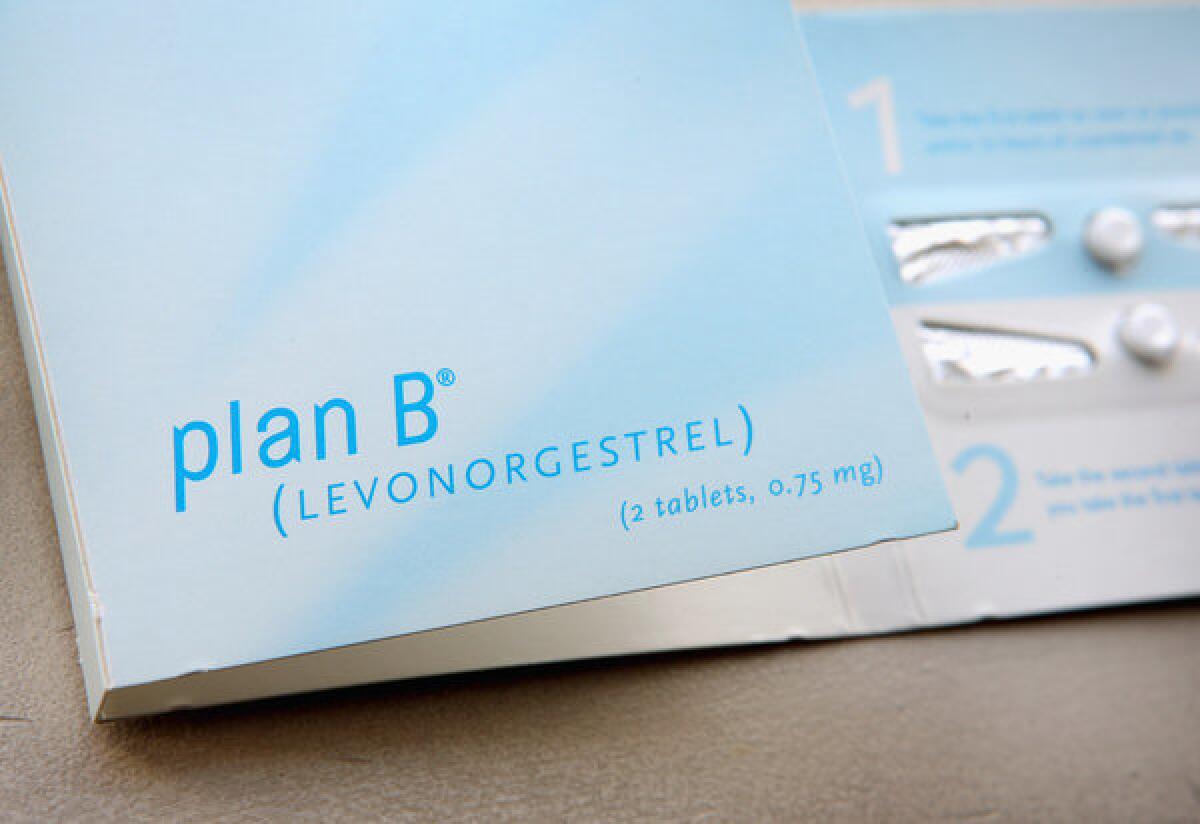A plan to make the morning-after pill a moot point

- Share via
It’s a new front in the long-running battle over reproductive rights, playing out this time as a clash between politics and science.
Doctors say there’s no medical reason to keep girls of any age from having easy access to the morning-after contraceptive known as Plan B. A judge’s ruling last month would do away with current age restrictions.
But the Justice Department appealed that ruling last week. The Obama administration wants to make the over-the-counter pill off-limits to girls younger than 15, unless they have a prescription.
Activists have denounced Obama’s plan as an assault on women’s rights.
But the women in question this time are 12, 13, 14 years old.
That’s had me straddling the fence, unable to rely on either science or politics to clear my head on this.
No 13-year-old girl should have to navigate fear of pregnancy alone.
But do girls that young really need more rights, more freedom to choose?
Or do we need to pay more attention to them and take more responsibility?
::
The principle is clear: All women should have access to and support for contraceptive care.
There’s fear that giving ground on this will fuel a rollback of those rights. But there’s also concern about the message we send when we make after-the-fact protection so easy for such young girls.
In practical terms, the changes being considered wouldn’t shake things up much. Plan B would move from behind the pharmacy counter and be available on shelves, alongside tampons, condoms and pregnancy tests.
It would still cost about $50 per dose. And it would still, under Obama’s plan, require ID for purchase. Those are considerable obstacles, if you’re 15 years old, with no job, driver’s license or passport.
Still, Plan B, in its 14 years, has changed the calculus of decision-making for young women. I don’t need a study to tell me that. I’m a single mother who’s raised three daughters.
My oldest was a teenager when “emergency contraception” came on the market. Taken within days of unprotected sex, the drug could prevent pregnancy by delaying ovulation. But teenagers didn’t benefit much; they couldn’t get it quickly enough and they had to see a doctor first.
By the time my youngest reached adolescence, teenage girls were carrying it around in their backpacks. Now, it’s handed out so freely at her college health center that students joke: You go in with a sprained ankle, you leave with Plan B.
Not that there’s anything wrong with that.
The drug is most effective in the 24 hours after unprotected sex. “Every 12 hours you wait increases the odds of pregnancy by 50%,” said Dr. Tracey Wilkinson. “You need to have this in your medicine cabinet the minute you need it.”
Wilkinson is a pediatrician at Children’s Hospital. She thinks it’s a good idea to equip teenagers with Plan B. Three years ago, she coauthored a study that found misinformation and confusion at pharmacies hinders access to the medication by teens. “Even with a prescription, they had trouble getting it,” she said.
She’s frustrated by people like me, who are bothered by the idea of giving unfettered access to girls so young.
“Nobody wants these young children to be having sex,” she said. “But by the time they’re 17, over half of adolescents are sexually active.”
And most will have sex for more than a year before they talk to a doctor about birth control.
::
I had a list of reasons to explain my ambivalence about expanding the use of Plan B, including the tacit approval of sex at 13 that it seems to imply.
I figured it might be an easy out for teenagers too afraid to talk to their parents about sex and too passive to insist that a partner wear a condom.
I wondered whether naive young girls might rely on Plan B instead of birth control, over and over and over, with repercussions to their developing bodies.
I worried that girls would be persuaded by their boyfriends to skip the use of condoms, since there’s an after-the-fact option.
It seemed that instead of empowering women, we might be putting more pressure on girls, taking away another reason in this sex-saturated culture that they’ve used to say no to sex.
But Wilkinson knocked down all of that, with stories and statistics.
“There’s a theory that [Plan B] is a passport to have unprotected sex,” she said. “But research shows that’s not how women respond to it.” Most — more than 60% — take it only once in their lives.
“They said the same thing about condoms,” Wilkinson reminded me. Now we’re grateful our daughters have them.
There’s no good reason to keep Plan B out of teenage girls’ hands, she said. “This medicine is incredibly safe. It’s not something to be afraid of.” Science tells her that.
But science also tells us that teenage brains are a work in progress, not quite developed enough to make wise choices, plan for the future, choose restraint over impulse.
That’s where we come in.
“Ideally,” Wilkinson said, “I like to have a conversation with all my patients about Plan A ... what they’re doing daily, weekly, monthly” to make Plan B unnecessary.
Maybe if we all had more of those conversations with our children — TV off, music turned down, laptops and phones put away — we wouldn’t need to have this talk about how hard we’re willing to make it to keep a 13-year-old from getting pregnant.
More to Read
Sign up for Essential California
The most important California stories and recommendations in your inbox every morning.
You may occasionally receive promotional content from the Los Angeles Times.










